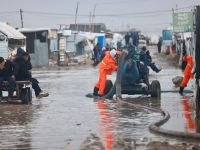OPEC leaders gather in Caracas this week amid a global oil crisis which is fueling angry consumer protests and warnings of economic slowdown worldwide.The summit, only the second such meeting in OPEC's 40-year history, is not formally scheduled to discuss crude oil prices which have surged to 10-year highs, sparking fears of the shattering oil shocks of the 1970s.
But heads of state and government of the Organization of Petroleum Exporting Countries (OPEC) are sure to face intense pressure as they gather in Venezuela, which currently holds the OPEC presidency, Wednesday and Thursday.
They are likely however to resist pressure for concrete action on prices."The price... is not on the agenda for the Caracas meeting," said Venezuelan Energy Minister Ali Rodriguez last week. "Its objective is to adapt the principles of OPEC to the new global reality," he added.
The severity of the latest global oil crisis was underlined by US President Bill Clinton's decision Friday to tap into Washington's Strategic Petroleum Reserve (SPR), a move not taken since the Gulf War a decade ago.
Soaring crude prices, which surged to 35 dollars a barrel in recent weeks, dipped in response to the decision, and Washington's allies welcomed the move -- but analysts questioned whether it will be more than a temporary fix.
The price spikes have sparked protests around the globe, notably in Europe where blockades initially in France have spread across the continent in the last few weeks.The pressure on OPEC continues despite its efforts.
Only Saturday the Group of Seven (G7) industrialized nations issued a statement in Prague saying it was "crucial" that OPEC take action, among others.
In Asia meanwhile governments have warned that the relentless rise in crude prices threaten fragile confidence and the pace of economic recovery from the region's 1997 economic meltdown.
"Oil prices cast a new shadow on the economic outlook," International Monetary Fund chief Horst Koehler warned bluntly last week in Prague, where the oil crisis is also clouding a meeting of the IMF and the World Bank.
While the Caracas summit is likely to be rich on fine words, including a "solemn" final declaration, OPEC insists it is not the place to take concrete measures -- much-demanded output increases -- to bring relief for consumers.
The cartel has already boosted production three times this in the last year -- the last hike, by 800,000 barrels a day, was agreed on September 10 and takes effect from October 1 -- in an attempt to cool down overheated markets.
And the 11-member cartel has pledged to pump even more oil if necessary, and its oil ministers will meet again at the OPEC headquarters in Vienna on November 12 to review the state of the markets.
The grouping is proud of the unified front which it has managed to present for the last two years, and which has helped revive prices from historic lows of under 10 dollars a barrel.
But clear splits remain, notably between poorer and smaller member states like Nigeria for whom high prices can only be good news, and countries like heavyweight Saudi Arabia, the only member with significant spare capacity.Not all OPEC heads of state and government will be in Caracas.
Notably absentees include Libya's Moamar Khadafi, and Iraqi leader Saddam Hussein, who further shook oil markets only last week by suggesting that neighbouring Kuwait was stealing from its oil reserves.
It was precisely that warning which preceded Baghdad's invasion of Kuwait and the subsequent 1991 Gulf War, which sent oil prices surging to over 40 dollars a barrel -- which some analysts predict it could soon reach again.
The Caracas summit, only the second ever such meeting in its history after one in Algiers 25 years ago, will be hosted by new Venezuelan President Hugo Chavez, whose country is the cartel's only Latin American member.
The summit was originally scheduled for earlier this year, but was postponed after the country was hit by devastating mudslides which killed thousands and severely hit the nation's economy.—AFP.
©--Agence France Presse.
© 2000 Mena Report (www.menareport.com)







